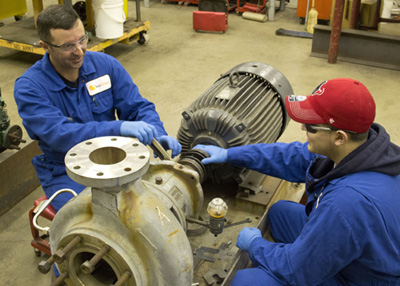Students get free job training with COM grant

For Aziz Sanders, it was job security. For John Aumiller it was a career change. Both found what they were looking for through a College of the Mainland grant program that pays for training to help the under-employed and un-employed find work quickly.
Sanders, of Hitchcock, worked a series of contract jobs as a scaffold builder with layoffs at the end of each before the H1-B Gulf Coast Ready to Work Grant helped him enroll in the COM Mechanical Maintenance Technician Program.
After several months of training, grant staff connected him with a paid mechanical maintenance apprenticeship at the University of Texas Medical Branch.
“I like taking things apart and putting them together again,” said Sanders. “We all work together to make sure the campus is working for hospital and patients.”
Aumiller, of La Marque, decided to switch careers from marine engineering to the growing field of instrumentation. He now also has a paid apprenticeship at UTMB shadowing an instrumentation technician.
“COM was the only institute who offered classes for instrumentation that didn't require any previous experience, so I decided to take the chance and take this course,” said Aumiller. “I'm thankful to the COM staff for helping source this job for me.”
Besides connecting students with employers looking to hire, grant program staff help students with interviewing, resume and job-seeking skills. They offer workshops plus one-on-one guidance.
“I learned how to make each job pop out on my resume. I learned how to show you’re right for the job,” said Sanders.
To qualify for the grant, students must be over 18 and have a high school diploma or GED. They must also be long-term under-employed or un-employed.
Individuals can select from several training areas including The National Center for Construction Education and Research (NCCER) electrical, instrumentation and pipefitting, welding, mechanical maintenance technician, CNC machinist, Lean Six Sigma, project management and drafting.
“Some students already know what career they want to pursue. Others we give information on the job market and salaries to help them choose what is right for them,” said Chris Hollman, H1-B Grant project coordinator.
The H1-B Ready to Work Grant is designed to help those who lost jobs or found jobs below their skill level after the recession beginning in 2007. It is funded by the U.S. Department of Labor Employment and Training Administration. Many of the job training areas are those identified as growing much faster than average by Workforce Solutions.
The program combines industrial craft training with job-seeking skills and industry partnerships.
“We connect students with jobs through our relationships with local employers,” said Hollman.
For more information about the grant, visit www.com.edu/ce/gcrtw-grant.
